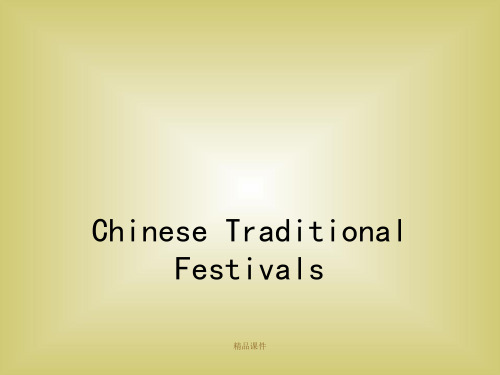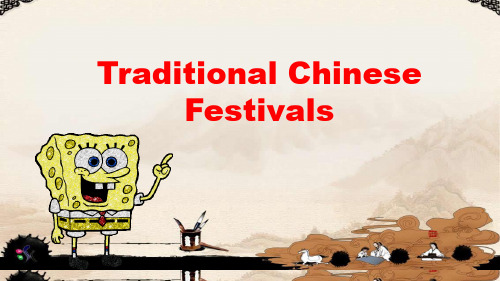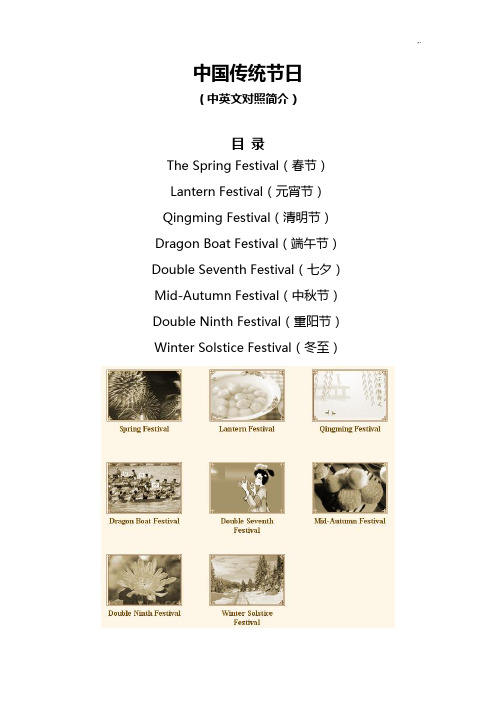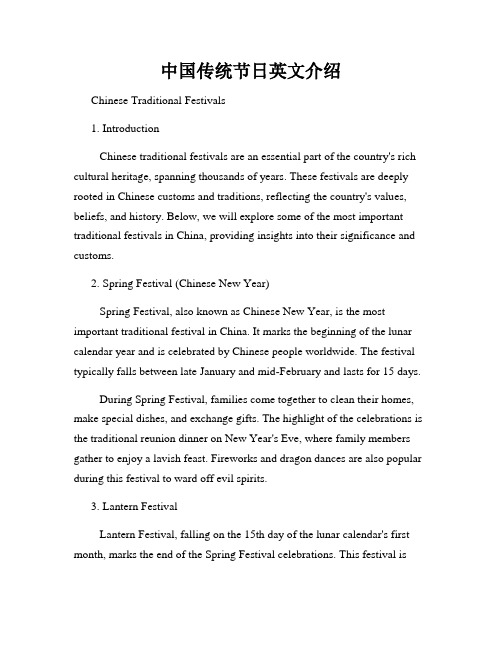Chinese Traditional festival(中国传统节日)
中国传统节日英文版

精品课件
Eat yuán xiāo or tāng yuán
精品课件
精品课件
精品课件
The dragon boat Festival
端午节 duān wǔ jié
5th day of the 5th lunar month
精品课件
qīng tuán(S)
zòng zi
Chinese Traditional Festivals
精品课件
Lunar Calendar 农历
nóng lì
精品课件
Chinese Zodiac
精品课件
Spring Festival 春节
chūn jié
Most important Get together
精品课件
Transport during the Spring Festival
精品课件
The Goddess Chang's fly to the moon 嫦娥奔月
Cháng’é bēn yuè
精品课件
Moon Cake 月饼
yuè bǐng
精品课件
Enjoy the glorious full moon with famlies or friends
(Xī’ ān 2016)
精品课件
The Lantern Festival 元宵节
yuán xiāo jié
huā dēng
精品课件
15th day of the 1st lunar month
The carnival of ancient China
精品课件
Customs Guessing lantern riddles
中国传统节日 英文版

The spring festival 春节 The Lantern Festival 元宵节 Tomb-sweeping Day 清明节 the Dragon Boat Festival 端午节 Double Seventh Day 七夕节 Mid-Autumn Day 中秋节
Double Seventh Day
——Chinese Valentine’s Day
Introduction
• full of romance • It' s on July 7th in the lunar calender each year • The Weaving Girl(织女) and the Cowherd(牛郎 ) in heaven would meet at the Magpie Bridge • Also called Begging-for-Dexterity Festival(乞 巧节)
• Many traditional customs and activities are held on the specified day by people in China and even by some people in neighbouring countries. Among these customs are dragon boat racing, eating zongzi, wearing a perfume pouch(香囊), tying fivecolour silk thread and hanging mugwort leaves(艾叶 ) and calamus(菖蒲).
Mid-Autumn Day 中秋节
中国传统节日(中英文对照)

中国传统节日(中英文对照简介)目录The Spring Festival(春节)Lantern Festival(元宵节)Qingming Festival(清明节)Dragon Boat Festival(端午节)Double Seventh Festival(七夕)Mid-Autumn Festival(中秋节)Double Ninth Festival(重阳节)Winter Solstice Festival(冬至)The Spring Festival(春节)The first day of the first lunar month is the New Year in the Chinese lunar calendar. Among the traditional Chinese festivals, this is the most important and the most bustling. Since it occurs at the end of winter and the beginning of spring, people also call it the Spring Festival.Chinese have many traditional customs relating to the Spring Festival. Since the 23rd day of the 12th lunar montha, people start to prepare for the event. Every family will undertake thorough cleaning, do their Spring Festival shopping, create paper-cuts for window decoration, put up New Year picturesb, write Spring Festival coupletsc, make New Year cakesd, and also prepare all kinds of food to bid farewell to the old and usher in the new.New Year's Eve is the time for a happy reunion of all family members, when they sit around the table to have a sumptuous New Year's Eve dinner, talking and laughing, until daybreak, which is called "staying up to see the year out". When the bell tolls midnight on New Year's Eve, people eat dumplings. In ancient times, midnight was called zishi (a period of the day from 11 p.m. to 1 a.m.). Dumplings (jiaozi) are eaten because it sounds the same as "change of the year and the day" in Chinese.From the first day of the lunar year, people pay New Year calls on relatives and friends, which is an important custom for the Spring Festival.Setting off firecrackers is the favorite activity of children in the Spring Festival. According to legend, this could drive off evil spirits. The continuous sound of firecrackers can be heard everywhere, adding to the atmosphere of rejoicing and festivity.Many places hold temple fairs. The wonderful dragon lantern dance and the lion dance performances, along with various handicraft articles and local snacks attract thousands of people.With the development of the times, some changes have taken place inthe customs of spending the Spring Festival. For example, to prevent environmental pollution, many cities have banned firecrackers. But this does not have an impact on the happy atmosphere of the festival. On New Year's Eve, family members get together to have dinner while watching TV programs.For Chinese at home and abroad, the Spring Festival is always the most important festival.农历的正(zheng)月初一,是中国的农历新年。
中国传统节日英文介绍

中国传统节日英文介绍Chinese Traditional Festivals1. IntroductionChinese traditional festivals are an essential part of the country's rich cultural heritage, spanning thousands of years. These festivals are deeply rooted in Chinese customs and traditions, reflecting the country's values, beliefs, and history. Below, we will explore some of the most important traditional festivals in China, providing insights into their significance and customs.2. Spring Festival (Chinese New Year)Spring Festival, also known as Chinese New Year, is the most important traditional festival in China. It marks the beginning of the lunar calendar year and is celebrated by Chinese people worldwide. The festival typically falls between late January and mid-February and lasts for 15 days.During Spring Festival, families come together to clean their homes, make special dishes, and exchange gifts. The highlight of the celebrations is the traditional reunion dinner on New Year's Eve, where family members gather to enjoy a lavish feast. Fireworks and dragon dances are also popular during this festival to ward off evil spirits.3. Lantern FestivalLantern Festival, falling on the 15th day of the lunar calendar's first month, marks the end of the Spring Festival celebrations. This festival ischaracterized by the display of colorful lanterns and various cultural activities.People often write riddles on their lanterns for others to solve, adding an element of fun and intellectual challenge to the festival. The iconic lanterns take many forms, including those shaped like animals, flowers, or famous landmarks. Watching the lanterns light up the night sky is a mesmerizing experience.4. Dragon Boat FestivalThe Dragon Boat Festival, also known as Duanwu Festival, is celebrated on the fifth day of the fifth lunar month. This festival commemorates the famous poet Qu Yuan and is characterized by the exciting racing of dragon boats.Dragon boat races involve teams of rowers paddling vigorously to the beat of a drum, competing to reach the finish line first. These races attract huge crowds of spectators who cheer and encourage the participants. Another significant tradition of this festival is the consumption of sticky rice dumplings called zongzi, which are wrapped in bamboo leaves.5. Mid-Autumn FestivalThe Mid-Autumn Festival, also known as the Moon Festival, is celebrated on the 15th day of the eighth lunar month. This festival is a time for family reunions and the appreciation of the full moon's beauty.The festival is closely associated with the legend of Chang'e, a celestial being who resides on the moon. During this festival, people gather to enjoy mooncakes, round pastries filled with various sweet or savory fillings.Lanterns in the shape of the moon are also prevalent during this festival, adding to the festive atmosphere.6. ConclusionChinese traditional festivals are not only grand celebrations but also an embodiment of the Chinese people's cultural identity and historical roots. Through these festivals, people reaffirm their bonds with family, pay respects to ancestors, and pass down customs and traditions to future generations.As China continues to modernize, it remains essential to preserve and cherish these traditional festivals as they play a vital role in maintaining cultural cohesion and fostering a sense of national unity. By understanding and appreciating these festivals, one can gain a deeper insight into the rich cultural tapestry of China.。
99个中华传统文化的英文表达

、 99个中华传统文化的英文表达一、传统节日1.传统中国节日:traditional Chinese festival2.农历:lunar calendar3.腊八节:Laba Festival4.小年:Little New Year5.除夕:Lunar New Year’s Eve6.春节:the Spring Festival7.正月初一:the lunar New Year’s Day8.元宵节:the Lantern Festival9.正月:the first month of the lunar year10.二月二:Dragon Heads-raising Day二、传统习俗1. 喝腊八粥:eat Laba porridge2. 扫尘:sweep the dust3. 扫房:spring cleaning4. 祭灶:offer sacrifices to the God of Kitchen5. 守岁:staying up6. 拜年:pay a New Year’s call7. 祭祖:offer sacrifices to one’s ancestors8. 祭财神:worship the God of Wealth9. 春联:Spring Festival couplets10.贴倒福:paste the Chinese character “Fu” upside down11.去晦气:get rid of the ill-fortune12.辞旧岁:bid farewell to the old year13.兆头:omen14.禁忌:taboo15.烧香:burn incense三、阖家团圆1. 吃团圆饭:have a family reunion dinner2. 年夜饭:New Year’s Eve dinner3. 全家团圆:family reunion4. 办年货:do Spring Festival shopping5. 敬酒:propose a toast6. 穿新衣:wear new clothes7. 红包:red envelops8. 压岁钱:gift money; money given to children as a Lunar New Year gift四、美食小吃1. 年糕:rice cake; New Year cake2. 饺子:dumpling; Chinese meat ravioli3. 汤圆:dumplings made of sweet rice4. 八宝饭:eight-treasure rice pudding (steamed glutinous rice with bean paste, lotus seeds, preserved fruit, etc.)5. 什锦糖:assorted candies6. 花生糖:peanut candy7. 蜜冬瓜:candied winter melon8. 糖莲子:candied lotus seed9. 瓜子:red melon seeds10.金桔:cumquat11.红枣:red dates12.春卷:spring roll13.冰糖葫芦:candied haws on a stick14.驴肉火烧:donkey burger15.腊肠:Chinese sausage16.米酒:rice wine17.腊肉:preserved meat18.糖板栗:sugar chestnut19.四喜丸子:four-joy meatballs五、民间艺术1. 泥人:clay figure2. 皮影戏:shadow puppetry3. 木偶戏:puppet show4. 刺绣:embroidery5. 剪纸:paper-cut6. 中国结:Chinese knot7. 年画:New Year painting8. 吹糖人:sugar-figure blowing9. 舞龙:dragon dance10.舞狮:lion dance六、曲艺表演1. 戏曲:traditional opera2. 折子戏:opera highlights3. 相声:comic dialogue; cross talk4. 小品:skits; sketch5. 口技:vocal imitations; ventriloquism6. 杂技:acrobatic performance7. 马戏:circus performance8. 京韵大鼓:drum song of Peking9. 踩高跷:walk on stilts10.杂耍:variety show; vaudeville七、娱乐活动1. 打麻将:play mahjong2. 庙会:Temple Fair3. 春节联欢晚会:Spring Festival gala4. 灯会:exhibit of lanterns5. 送贺卡:sending New Year’s greeting cards6. 理发:have a haircut7. 放烟花:set off fireworks8. 放鞭炮:set off firecrackers9. 灯谜:riddles written on lanterns八、其他1. 门神:the God of Door2. 灶神:the God of Kitchen3. 财神:the God of Wealth4. 土地爷:the God of Land5. 火神:the God of Fire6. 喜神:the God of Happiness7. 福寿禄三星:the three gods of fortune, prosperity and longevity8. 八仙:the Eight Immortals9. 生肖、属相:Chinese zodiac10.猪年:the year of the Pig11.微信红包:WeChat red envelope12.年:Nian; Year monster13.本命年:the animal year in which one was born14.春运:Spring Festival travel rush15.24节气: 24 Solar Terms16.立春:the Beginning of Spring17.雨水:Rain Water18.惊蛰:the Waking of Insects19.春分:the Spring Equinox20.清明:Pure Brightness21.谷雨:Grain Rain22.立夏:the Beginning of Summer23.小满:Lesser Fullness of Grain24.芒种:Grain in Beard25.夏至:the Summer Solstice26.小暑:Lesser Heat27.大暑:Greater Heat28.立秋:the Beginning of Autumn29.处暑:the End of Heat30.白露:White Dew31.秋分:the Autumn Equinox32.寒露:Cold Dew33.霜降:Frost’s Descent34.立冬:the Beginning of Winter35.小雪:Lesser Snow36.大雪:Greater Snow37.冬至:the Winter Solstice38.小寒:Lesser Cold39.大寒:Greater Cold。
中国传统节日英文介绍

Qing Ming
Du Mu( Tang Dynasty )
Qing Ming usually comes with rainy days
பைடு நூலகம்
清明时节雨纷纷, 路上行人欲断魂, 借问酒家何处有, 牧童遥指杏花村.
I ask a Buffalo boy for tavern ['tævən] to release my sadness Passengers on the way are full of soreness
He points to the village covered by apricot ['eiprikɔt] blossoms
Chinese Valentine’s Day
The seventh day of the seventh month of the lunar calendar is known as Qi Xi Jie or Qiqiao Jie, a traditional holiday that has been recently called China's Valentine's Day.
In China, the most traditional and popular Spring Festival food is dumpling, which looks like the moon with vegetables and meat mixed in it. The Chinese name of dumpling is “JIAO ZI”, ”JIAO” means ”cross”, ”ZI” is Chinese traditional time represents “24:00”, so the Chinese word “JIAO ZI” means “cross 24:00”, just the dividing point of last year and next year. So when it comes to 24:00, every family begins eating dumplings.
中国传统节日和民俗简介(附英文)
中国传统节日Traditional Chinese holiday中国的传统节庆膳食是节日必不可少的伴侣。
例如,我国的端午节(the Dragon Boat Festival)是纪念古代诗人屈原的日子。
那一天,人们通常要赛龙舟、吃粽子(zongzi)。
中秋节是观赏满月的日子。
圆圆的月亮象征着圆满,象征着家庭团聚。
因此,中秋节(TheMid-autumnFestival)的特制食品是一种圆形的月饼。
春节是中国的农历新年(the Chinese lunar New Year’s holiday),除了常见的家禽和肉类之外,人们还要按各自的地方习俗烹制传统食物,如饺子和年糕。
端午节The Duanwu Festival端午节,又叫龙舟节,是为了纪念爱国诗人屈原。
屈原是一位忠诚和受人敬仰的大臣,他给国家带来了和平和繁荣。
但最后因为受到诽谤(vilify)而最终投河自尽。
人们撑船到他自尽的地方,抛下粽子,希望鱼儿吃粽子,不要吃屈原的身躯。
几千年来,端午节的特色在于吃粽子(glutinous dumplings)和赛龙舟,尤其是在一些河湖密布的南方省份。
春节The Spring Festival在我国,一年有很多节日,在这些节日中,我最喜欢春节。
这不仅因为它是一年中最大的节日,更因为它是新一年的开始,给人们带来新的希望,也因为它是亲朋好友团聚的时刻。
不管身在何方,人们总会在春节前回到家里准备过节。
通常,我们会在除夕夜吃一顿丰盛的晚餐,之后家人团座一起,分享一年以来的生活以及新年计划。
有的人则会玩游戏或者出去玩。
大年初一,人们通常会早起,会与见到的人说吉祥话。
孩子们会得到压岁钱。
在接下来的几天里,人们会带上新年祝福互相串门拜年。
总之,春节是一个欢聚一堂、供人享乐的日子。
元旦New Year's DayToday is the New Year’s Day. I have a three-day holiday, so I can go out have fun or stay at hometo have a good rest. Today, my parents take me out. We go to the mall. Many things are cheap somy mother buys many. I have a new cloth and a pairof shoes. I am so happy. They are the gifts forthe New Year. At night, we have a big dinner outside. The foods are so delicious. Today is a happyday.国庆节The National Day10月1日是我国的国庆节,这是全国的共同节日。
中国传统节日中英文
三. Dragon Boat Festival
Dragon Boat Festival is Fifth day of lunar month, Han Chinese traditional festivals.
Hale Waihona Puke customs of the Dragon Boat Festival
Eating zongzi--rice ball wrapped in bamboo leaves Dragon boat race
Dragon heads-raising Day 二月二
寒食节——the cold food day
寒食节,亦称“禁烟 节”、“冷节”、 “百五节”。在每年 四月四日,清明节的 前一天。这一日,禁 烟火,所以人们不会 煮热饭热菜,而只吃 冷食。寒食节前后绵 延两千余年,曾被称 为民间第一大祭日。
Tomb-sweeping Day
The custom of the Ching Ming Festival
We will fly a kite in the field, Enjoy the beautiful spring.
清明上河图
Qingming worship
Ching Ming is the most important festival of sacrifice, we come to worship and grave to commemorate our ancestors
eat dumplings
to stay up late all night on New Year‘s Eve 守岁
to set off firecrackers
中国传统节日 英文
Zong Zi is a kind of rice dumpling wrapped in reed leaves to form a pyramid.
Tanabata Festival
The Double-Seventh Festival
Time
It’s on July 7th in the lunar calendar each year.
The Mid-autumn Festival
The Mid-autumn Festival is traditionally celebrated on the fifteenth day of the eighth month on the lunar calendar
Time
The Mid-Autumn Day
Significance
The Dragon Boat Festival
Time It’s on May 5th in the lunar calendar of each year. Custom ①Hanging portrait of Zhong Kui (to drive away demons)悬钟 馗像 ②Hanging mugwort, calamus插艾叶菖蒲 ③Dragon boat race 赛龙舟 ④Eating the rice dumplings 吃粽子 ⑤Drinking realgar wine 饮雄黄酒
The Festival
Time It’s on September 9th in the lunar calendar of each year. Custom ①Climbing 登高 ②Eating Double-Ninth cakes 吃重阳糕 ③Appreciating chrysanthemum 赏菊 ④Drinking chrysanthemum wine 饮菊花酒
Chinese Traditional Festivals(中国传统节日)
Useful dialogue
The Spring festival is also known as the Chinese New Year, which is the most important traditional festival in China.
It falls on the first day of the
3. Whole fisinese language is pronounced as “Yu”. It sounds like “余”. “年年有余”means
togetherness and abundance(富足).
Group work
Which festival do you like best? Why? List your reasons.
• The Double—seventh Festival is not so well—known to many young people.but the related sad love story about the poor cowherd and the Girl Weaver has been passed down from generation to generation
springfestival春节lanternfestival元宵节dragonboatfestival端午节chinesetraditionalfestivals端午节midautumnthemoonfestival中秋节qixifestivaldoubleseventh七夕节doubleninthfestival重阳节tombsweepingfestival清明节otherfestivalsnewyearsdaywomensdayarborday植树节internationallabordayyyouthdaychildrensdayarmybirthdayteachersdaynationaldaythenewyearseveleadin?lookatthepictureswhichmayremindyouofthememoryofthespringfestivalfirecrackerslunarnewyearspaintingspapercutspringfestivalcoupletsnewyearsvisitcctvspringfestivalgalastep1brainstormbrainstormvocabularyonthespringfestivalingroups
- 1、下载文档前请自行甄别文档内容的完整性,平台不提供额外的编辑、内容补充、找答案等附加服务。
- 2、"仅部分预览"的文档,不可在线预览部分如存在完整性等问题,可反馈申请退款(可完整预览的文档不适用该条件!)。
- 3、如文档侵犯您的权益,请联系客服反馈,我们会尽快为您处理(人工客服工作时间:9:00-18:30)。
December 19th,2011
Ⅰ, Introduction for classify of Chinese Traditional Festival Ⅱ, There are mainly 6 festivals celebrated in China
Chinese New Year Traditions
The Eve of the Chinese New Year is very carefully observed. Supper is a feast, with all members coming together. One of the most popular Chinese New year tradition course is “jiaozi”, dumplings boiled in water. "Jiaozi" in Chinese literally mean "sleep together and have sons", a long-lost good wish for a family. After dinner, it is time for the whole family to sit up for the night while having fun playing cards or board games or watching TV programs dedicated to the occasion. It is also a radition to keep every light on the whole night. At midnight, fireworks will light up the whole sky as people's excitement reach its zenith.
Chinese New Year Traditions
The Lantern Festival marks the end of the Chinese New Year season and afterwards life becomes daily routines once again. Traditions of the Chinese New Year vary from place to place, considering that China is a big country not only geographically, but also demographically and ethnically. Yet, the spirit underlying the diverse celebrations of the Chinese New Year is the same: a sincere wish of peace and happiness for the family members and friends.
Chinese New Year Celebration
Chinese New Year Traditions
Chinese Culture is rich in its culture and traditions . They have their own beliefs.
and New Year traditions , which they follow ardently. Although the Chinese New Year , Nian, lasts only two or three days including the Chinese New Year's Eve, the Chinese New Year season extends from the mid-twelfth month of the previous year to the middle of the first month of the new year. A month from the onset of the Chinese New Year, it is supposed to be a good time for business. People will pour out their money to buy presents, decoration material, food and clothing.
Chinese Festival
The Chinese Festivals are the identity of the Chinese culture and presence in the world. So lets take you on a trip to the wonderful land of Chinese festivals:
Chinese New Year Celebration
e ancestors and deceased members of the family. With occurrence of new moon on the first day of the New Year, begins the celebrations of The Chinese New Year and ends after fifteen days. The Chinese New Year festival is a celebrated among the family members. It is seen as an occasion of family get together and thanksgiving.According to the Chinese customary, a religious ritual is held as a tribute to the Heaven and Earth that are considered to be the Gods and Savior of the family and ancestors. During this occasion, a sacrifice is made given to honors th
Chinese Festival
Every country has its own days of celebrations, the days, which are associated with its culture, its history, its art and most importantly its origin. These days are termed as festivals of the country. China being a traditional country has its own set of festivals, which are based on the Chinese lunar calendar. There are mainly 6 festivals celebrated in China. The Chinese New Year, The lantern Festival, The Qingming festival, The Dragon boat Festival, The mid-Autumn Festival and The Double Ninth festival are the 6 festivals celebrated with great pomp and show all over China. We try to bring to you certain information regarding the legends associated with these Chinese festivals, the different beliefs of people associated with these Chinese festivals, the rituals performed on these Chinese festivals and the food prepared on these festivals.
Chinese New Year Traditions
It is the Chinese New Year tradition that every family gives its house a thorough cleaning, hoping to sweep away all the ill-fortune there may have been in the family to make way for the wishful in-coming good luck. People also give their doors and window-panes a new paint, usually in red color. They decorate the doors and windows with paper-cuts and couplets with the very popular theme of "happiness", "wealth", "logevity" and "satisfactory marriage with more children". Paintings of the same theme are put up in the house on top of the newly mounted wallpaper. In the old days, it was a Chinese New year tradition to distribute various kinds of food at the alta of ancestors.
A, The Chinese New Year
